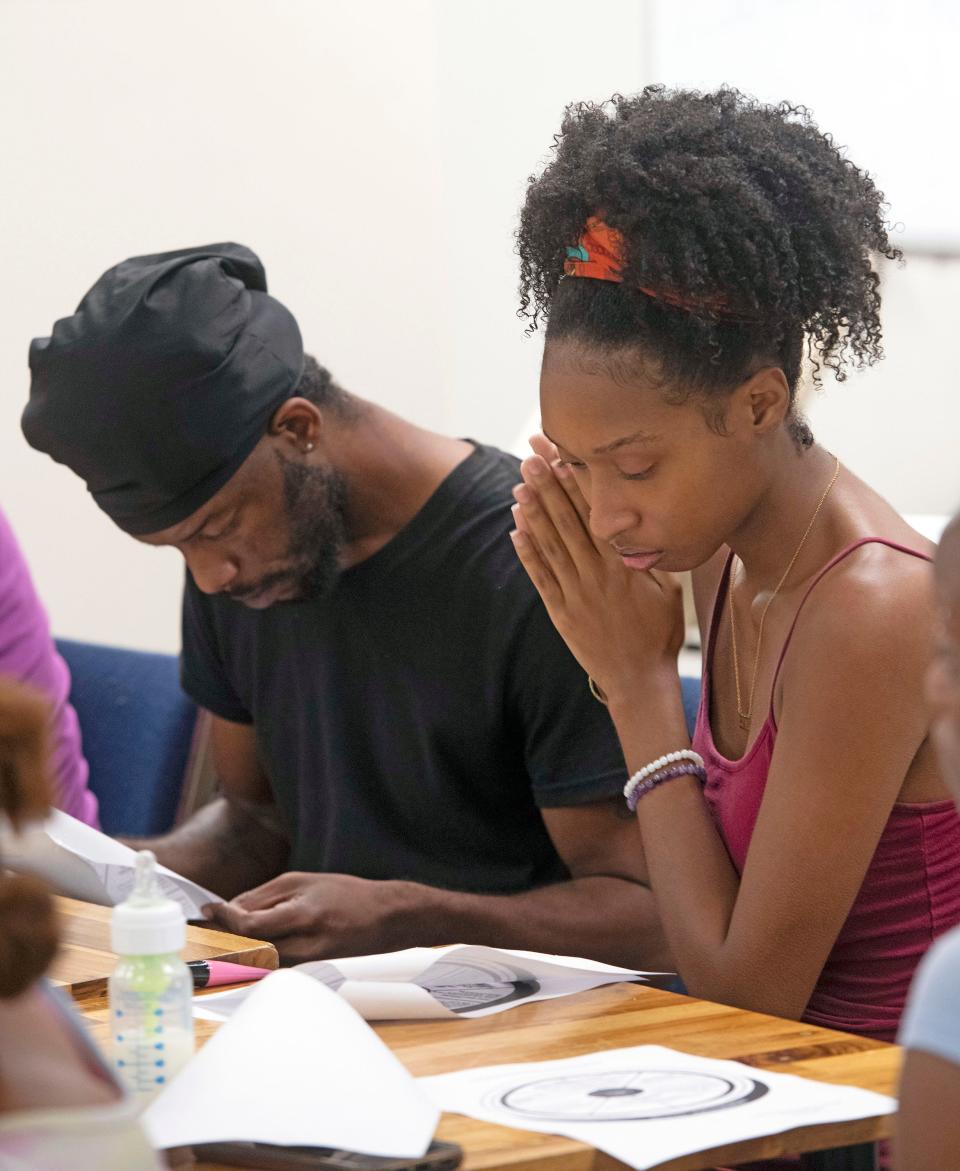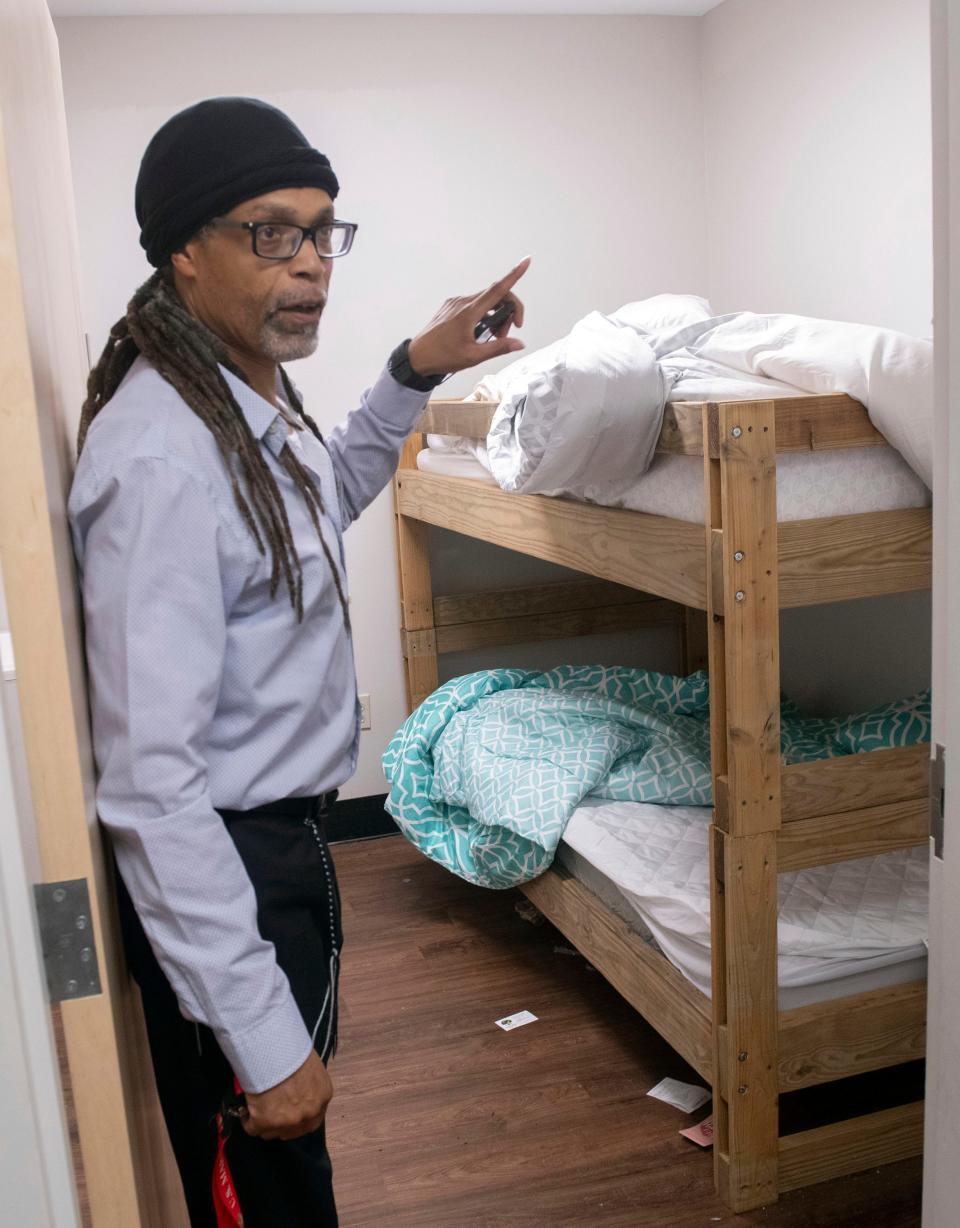Even with flooding and financial woes, Max-Well Center helps hundreds in its first year
For the past several years, Adonis and Aiyana Garrison have bounced from city to city, across the country, looking for opportunities to get back on their feet. The couple knocked on doors from Texas to Seattle, and Los Angeles to North Carolina, living out of their car.
A U.S. Army veteran from New Orleans, 30-year-old Adonis Garrison said he mismanaged his money when he was younger. He and his wife, who is 20, have struggled to find a place to stay while they looked for work and tried to build a life together.
They came to Pensacola to visit a friend and for Adonis to enroll in barbering college at Pensacola State College, but he had to wait to get in it.
They started knocking on doors again looking for help, and they finally found it.
One year anniversary: Pensacola's new homeless shelter seeks to end 'revolving door' of homelessness
Flooding: Pensacola's Max-Well Respite Center recovers from last week's flooding event

Through 90 Works, an agency that helps homeless and at-risk individuals move out of crisis and build a stable life, the Garrisons were connected with Max-Well Respite Center, a transitional housing program in Pensacola under the nonprofit organization Re-entry Alliance Pensacola.
“These people have been a great help to us,” said Adonis Garrison, “very supportive and pretty much whatever we've needed from the time we walked through the door.”
Here they’ve found a safe, temporary place to live and the resources they needed to climb out of the situation, including financial management, communication and social skills classes, as well as the support of others in the program.
“I will say that it taught me a lot of patience and self-control and to help me deal with my anxiety and anger,” said Aiyana Garrison, “like when things don't go my way and I'm kind of mad at the world about it. Being here taught me that with time and patience, if you work on it, things will happen.”
Adonis is now working and enrolled in barbering school and the couple, who just learned they are expecting their first child, will soon be moving into a place of their own.
“I know it's a long road still, but I want to get my GED and maybe start some cosmetology classes, you know, do something as far as with the baby still being in my tummy,” Aiyana Garrison said. “I want to start doing something more productive before the baby comes. So yeah, that's one of my goals.”
What does Max-Well Respite Center do?
The goal of Max-Well Respite Center is to help people like the Garrisons become independent. There are more than 80 people in the program, including children, at any given time and there’s a long list of people waiting to enter as soon as someone moves out.

It’s one of the few programs in the area that take in families, but the 17,000-square-foot building at the corner of Maxwell and Palafox streets also has rooms for couples, veterans and other individuals.
This month the center is celebrating its one-year anniversary and Director Troy Watts is thrilled with their progress, so far.
“We can't solve the universal problems of society,” said Watts, “but what we can do is help one person at a time and in doing that, it makes me feel great, especially our numbers, they make me feel great.”
Reopened: Pensacola homeless shelter damaged in flooding needs community help to get back to normal
Over the past year, Max-Well Respite Center has served hundreds of people with beds, meals and other services including helping people obtain their birth certificates and get a state ID or driver’s license.
Residents Served at Max-Well Respite Center from 2022 – 2023:
373 heads in beds
83 children assisted in attending school
69 childcare vouchers provided for daycare so parents can work
80,000 meals served
2,608 case management services provided
186 obtained birth certificates
151 obtained social security cards
127 obtained state ID or driver’s license
68 re-entered the workforce
70 obtained steady housing
19 seeking GED
Everyone who comes into the program is expected to follow the rules, like no fighting, stealing or drinking alcohol, as well as being respectful of others.
They are also expected to work with case managers on a plan to improve their situation, through life skills classes, pursuing an education, and/or working a job.
“You're working,” said Watts. “You get a job, you keep your room clean, you study. We have a study room back here. You continue to study, read to your kids. There’s always something that we can do to make the kids and the parents better and that's all we do here.”
Working through challenges
The year has not been without it’s struggles. In June, the entire facility was evacuated in the middle of the night when a combination of torrential rain and clogged street drains caused the facility to flood.
The owners of the building had it back open within days, with help and donations from the community like bunk beds built by Sleep in Heavenly Peace, a Pensacola nonprofit that builds beds for children in need to ensure that “no kid sleeps on the floor in our town.”
Paying the bills can sometimes also be a challenge. REAP relies on government and philanthropic donations to stay afloat. Residents are also charged “transitional fees” of around $90, or less if they can’t afford it, to help cover costs.
“It's not a lot, but it's just something to show them that you have to pay something to live,” said Watts. “It lets them see that they have to be responsible when paying rent or bills.”
Out of money: Pensacola's largest women and children's shelter is on the brink of closing. Here's why.
The program isn’t for everybody who enters. Watts said as long as people are making progress they can stay, but he makes it clear they are free to leave anytime they feel it’s not working for them.
“My thing is if you want to be here, show me you want to be here,” said Watts. “It's as simple as that because other people do. That’s my whole thing, because we have a 200-plus waiting list, plus kids, that are trying to get in here. I get calls at home from people and other organizations asking for somebody, ‘Can we come in?’ I have to put them on the waiting list.”
Across town, another REAP shelter, REAP Lodges Transitional Shelter for single women and mothers with children, was on the brink of closing due to lack of funding.
Help is on the way: Escambia County helps struggling women's shelter, but solution won't last long
REAP Executive Director Vinnie Whibbs said help from Escambia County, philanthropic and faith-based groups, as well as other local leaders is helping them keep their doors open.
“I feel most hopeful that this thing will be able to be worked out, that we will figure out ways to continue its operation and keep serving the people that we need to serve,” Whibbs said.
Moving forward
Shelters are expensive to operate and even though the need is great there are only so many beds to go around. Watts hopes more support from the community will make it possible for Max-Well Respite Center to not only maintain services but also expand them to others who can’t afford to pay.
The Garrisons are thankful they found help here because now they have something they didn’t have before: hope for the future.
“Before we got here, it was like there was nothing left,” said Aiyana Garrison. “I'm really happy about being here and I don't regret it. I'm not paranoid about it like I was before, because now it's more certain that we can have a place and things will be more comfortable for all of us, including the baby.”
“I couldn't ask for a better place to be,” said Adonis Garrison. “I'm forever going to be thankful to the Max-Well Center.”
This article originally appeared on Pensacola News Journal: Pensacola Max-Well Respite Center helps homeless families find footing

